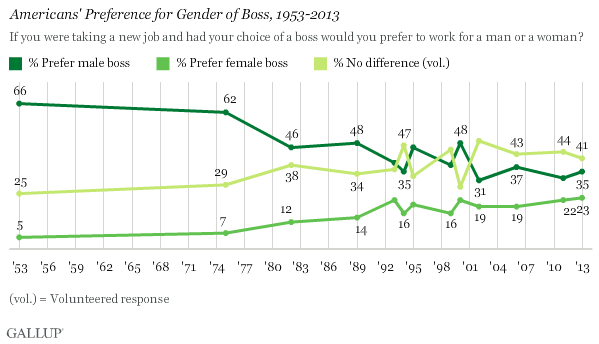Gallup reports, “Americans Still Prefer a Male Boss.” But the glaring stall story in the trend hasn’t made the news. Here is the trend:
It looks to me like the percentage preferring a male boss hit 35% in 1994, and that’s where it stands now (they ask this hypothetical question of people whether they are employed or not). I don’t find the stall in any of the reporting.
Katy Waldman in Slate said the numbers “represent progress from 1953,” but didn’t mention the stall. Derek Thompson on the Atlantic site said, “In the last 60 years, the male/female boss gap has narrowed from 61 points to just 8 12 points” (he corrected it when I pointed out the arithmetic error). He didn’t mention that the gap was down to about 15 points already by the early 1990s — two decades ago.
Another Atlantic story (which corrected the starting date of the trend after I pointed out the error — hitting my limit of two free corrections per corporate site per day) was titled, “When It Comes to Female Bosses, Women Can Be Their Own Worst Enemy,” and also made no mention of the stalled trend. Other writeups also mentioned the female-boss preference was “up significantly from 1953.”
I wish there were an understanding of the gender stall among the web-based-journalism class. Gallup reasonably wrote in their release:
It is also possible that the experience of working for a female boss affects workers’ preferences. If the latter is the case, and if the proportion of U.S. workers who have female bosses increases in the future, the current preference for a male boss in the overall population could dissipate.
Thompson seized on that conclusion, but missed the equivocation:
The upshot, which Gallup emphasizes, is that most Americans work for guys today, and as more women become bosses, more Americans will probably feel comfortable with women as their boss—or, just as likely, decide it doesn’t really make a difference in the first place.
And the other Atlantic piece mention it, either, concluding, “so there’s hope yet.” (In fairness to the Atlantic writers, where are they going to get this information? Their own site hasn’t published one of my posts mentioning the stall in gender progress since April — ok, twice in April — and before that you’d have to go back to February, February, or December. And that’s, like, a billion Tweets ago.)
But anyway, how about that increase in female managers, who are likely to change these widespread social attitudes against female managers? Don’t hold your breath:
 No change since the mid-1990s. Who knew? People who, for example:
No change since the mid-1990s. Who knew? People who, for example:
- Read David Cotter, Joan Hermsen, and Reeve Vanneman’s article, “The End of the Gender Revolution? Gender Role Attitudes from 1977 to 2008” in the American Journal of Sociology.
- Read “The Gender Revolution: Uneven and Stalled,” by Paula England in Gender & Society.
- Read the paper by Matt Huffman, Stefanie Knauer and me, “Stalled Progress? Gender Segregation and Wage Inequality Among Managers, 1980-2000,” in Work & Occupations.
- Follow the gender inequality tag
- Follow the Hanna Rosin tag
Or others who look carefully at the trends they’re reading and writing about.


Keep ’em coming Philip! Why have we stalled altogether??? There seems to have been a real push back against feminism…. WHY????
LikeLike
But Philip, Men are Ending! It’s all over the news!
LikeLike
Generally speaking I’d much rather work for a woman. Over the years I had both men and women bosses and the men were without exception unapproachable and unreasonable bastards. Of the women, only one was like the men and that was only because she emulated male bosses deliberately because she was insecure of her own ability.
I don’t say women can’t be a pain in the ass (all bosses are at one point or another), but the women I’ve worked for have mostly been easier to talk to, more approachable, and more willing to exchange ideas than the men.
LikeLike
3 of my last 4 bosses have been women, and all have treated me fairly. OTOH, my wife hates working for women, thinking them variously petty, passively vicious or incompetent. Her opinion of working with women is just as dim.
LikeLike
Well, a 45-55 ratio of female-to-male managers is not that great of an inequality. If you assume a huge proportion of the US population believes in old-school Christian gender relations, it should not even be surprising…
LikeLike
Also, if a lot of women chose to raise children on their own, and not devote resources to climbing the corporate ladder, this should not be surprising either.
LikeLike
And it should be mentioned that the plurality of respondents do not care either way. Not an awful result either…
LikeLike
“I wish there were an understanding of the gender stall among the web-based-journalism class.” I wish magazines and news sites had gender consultants so that the bloggers and academics wouldn’t have to constantly point out their mistakes. Imagine the time it would save all of us!
LikeLike